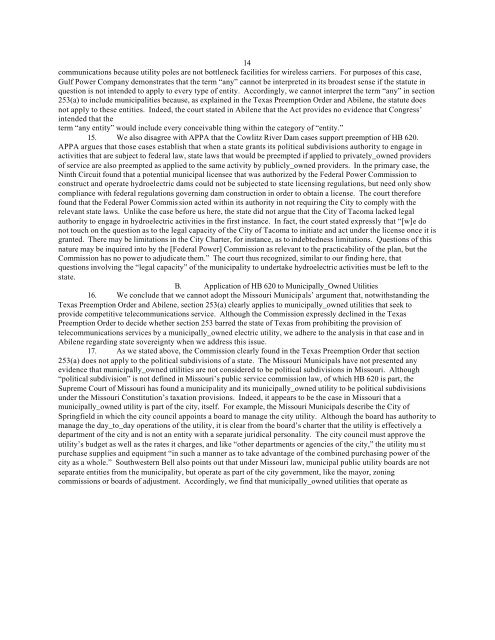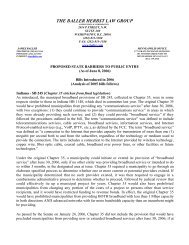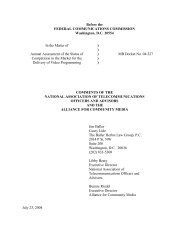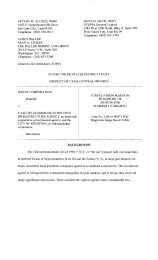Petition for Writ of Certiorari
Petition for Writ of Certiorari
Petition for Writ of Certiorari
You also want an ePaper? Increase the reach of your titles
YUMPU automatically turns print PDFs into web optimized ePapers that Google loves.
14<br />
communications because utility poles are not bottleneck facilities <strong>for</strong> wireless carriers. For purposes <strong>of</strong> this case,<br />
Gulf Power Company demonstrates that the term “any” cannot be interpreted in its broadest sense if the statute in<br />
question is not intended to apply to every type <strong>of</strong> entity. Accordingly, we cannot interpret the term “any” in section<br />
253(a) to include municipalities because, as explained in the Texas Preemption Order and Abilene, the statute does<br />
not apply to these entities. Indeed, the court stated in Abilene that the Act provides no evidence that Congress’<br />
intended that the<br />
term “any entity” would include every conceivable thing within the category <strong>of</strong> “entity.”<br />
15. We also disagree with APPA that the Cowlitz River Dam cases support preemption <strong>of</strong> HB 620.<br />
APPA argues that those cases establish that when a state grants its political subdivisions authority to engage in<br />
activities that are subject to federal law, state laws that would be preempted if applied to privately_owned providers<br />
<strong>of</strong> service are also preempted as applied to the same activity by publicly_owned providers. In the primary case, the<br />
Ninth Circuit found that a potential municipal licensee that was authorized by the Federal Power Commission to<br />
construct and operate hydroelectric dams could not be subjected to state licensing regulations, but need only show<br />
compliance with federal regulations governing dam construction in order to obtain a license. The court there<strong>for</strong>e<br />
found that the Federal Power Commis sion acted within its authority in not requiring the City to comply with the<br />
relevant state laws. Unlike the case be<strong>for</strong>e us here, the state did not argue that the City <strong>of</strong> Tacoma lacked legal<br />
authority to engage in hydroelectric activities in the first instance. In fact, the court stated expressly that “[w]e do<br />
not touch on the question as to the legal capacity <strong>of</strong> the City <strong>of</strong> Tacoma to initiate and act under the license once it is<br />
granted. There may be limitations in the City Charter, <strong>for</strong> instance, as to indebtedness limitations. Questions <strong>of</strong> this<br />
nature may be inquired into by the [Federal Power] Commission as relevant to the practicability <strong>of</strong> the plan, but the<br />
Commission has no power to adjudicate them.” The court thus recognized, similar to our finding here, that<br />
questions involving the “legal capacity” <strong>of</strong> the municipality to undertake hydroelectric activities must be left to the<br />
state.<br />
B. Application <strong>of</strong> HB 620 to Municipally_Owned Utilities<br />
16. We conclude that we cannot adopt the Missouri Municipals’ argument that, notwithstanding the<br />
Texas Preemption Order and Abilene, section 253(a) clearly applies to municipally_owned utilities that seek to<br />
provide competitive telecommunications service. Although the Commission expressly declined in the Texas<br />
Preemption Order to decide whether section 253 barred the state <strong>of</strong> Texas from prohibiting the provision <strong>of</strong><br />
telecommunications services by a municipally_owned electric utility, we adhere to the analysis in that case and in<br />
Abilene regarding state sovereignty when we address this issue.<br />
17. As we stated above, the Commission clearly found in the Texas Preemption Order that section<br />
253(a) does not apply to the political subdivisions <strong>of</strong> a state. The Missouri Municipals have not presented any<br />
evidence that municipally_owned utilities are not considered to be political subdivisions in Missouri. Although<br />
“political subdivision” is not defined in Missouri’s public service commission law, <strong>of</strong> which HB 620 is part, the<br />
Supreme Court <strong>of</strong> Missouri has found a municipality and its municipally_owned utility to be political subdivisions<br />
under the Missouri Constitution’s taxation provisions. Indeed, it appears to be the case in Missouri that a<br />
municipally_owned utility is part <strong>of</strong> the city, itself. For example, the Missouri Municipals describe the City <strong>of</strong><br />
Springfield in which the city council appoints a board to manage the city utility. Although the board has authority to<br />
manage the day_to_day operations <strong>of</strong> the utility, it is clear from the board’s charter that the utility is effectively a<br />
department <strong>of</strong> the city and is not an entity with a separate juridical personality. The city council must approve the<br />
utility’s budget as well as the rates it charges, and like “other departments or agencies <strong>of</strong> the city,” the utility mu st<br />
purchase supplies and equipment “in such a manner as to take advantage <strong>of</strong> the combined purchasing power <strong>of</strong> the<br />
city as a whole.” Southwestern Bell also points out that under Missouri law, municipal public utility boards are not<br />
separate entities from the municipality, but operate as part <strong>of</strong> the city government, like the mayor, zoning<br />
commissions or boards <strong>of</strong> adjustment. Accordingly, we find that municipally_owned utilities that operate as






